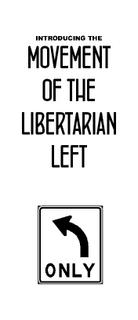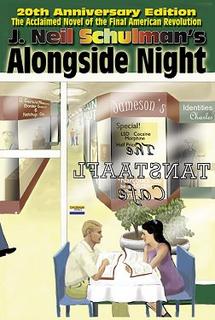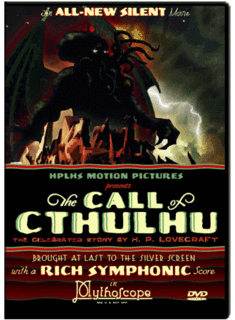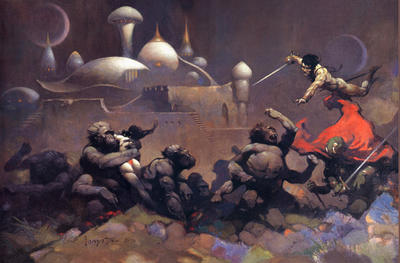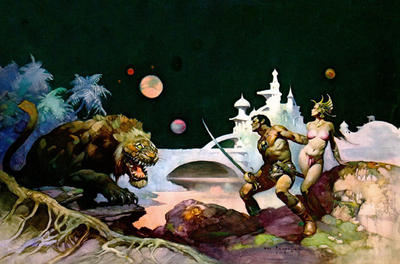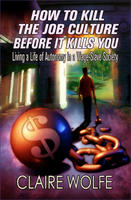 You look all wrung out.
You look all wrung out. I am. I spent the weekend aboard Joss Whedon’s Serenity, the sci-fi western noir action suspense movie extension to his short-lived Firefly TV series. As Mal Reynolds might say, I’ve been rode hard and... Well, you get the idea.
So you liked Serenity?
Liked it? I loved it. I was thrilled by it. I was exhilarated by it. As a hardcore Firefly geek, I couldn’t be happier. As a fan of movie sci-fi generally, I feel the same elation I felt when I saw the original Star Wars on its opening weekend in 1977. Serenity is terrific.
If you love it so much, why don’t you marry it?
Go HWONG-TONG.
Do you have to be a Firefly fan — or at least familiar with the TV series — to enjoy Serenity?
Nope. I saw it with adult friends and their two teenaged kids on opening day. None had ever heard of Whedon’s series before but had thought the trailers looked fun. They all thoroughly enjoyed the film and are now anxious to watch the Firefly DVDs. The theater audience Friday night contained some obvious fans, but the crowd was made up largely of the “uninitiated.” And there was hearty applause from almost everyone during the end credits.
Of course, Serenity will impact you differently if you are a fan of the TV show. On the other hand, my friends will now have many pleasant “aha!” moments as they experience Serenity’s back-story for the first time via the series. There’s really something positive to be said for both approaches to Serenity, as someone already familiar with Whedon’s universe and as a newbie.
Did the entire TV cast return for the movie?
Yes.
I’ve heard that Serenity is really River Tam’s story and that no one else gets enough screen time.
River, played by Summer Glau, is central to the movie’s plot. So she naturally gets more screen time than most other cast members. But when you move nine much-loved characters from a TV series to the big screen, you have to expect that. After all, did Scotty and Sulu ever really get their fair share of screen time in the Star Trek movies? Let me just say that every cast member from Firefly has a memorable moment and/or a great line or two in this movie. For example, Shepherd Book, played by Ron Glass, may appear for less than 10 minutes, but his scenes are pivotal and heartwarming. If you love Shepherd, you won’t be disappointed.
So is this movie River's story or not?
If Serenity is any one character’s story, it’s really Captain Malcolm Reynolds’ [Nathan Fillion]. Mal’s got a choice to make. Does he put memories of the War for Unification behind him, forget his ideals (freedom and anti-imperialism), surrender a crew member to the Alliance, and remain content to spend the rest of his life avoiding trouble? Or does he take a stand and confront the enemy and its so-called “well-intentioned” plans for the universe? Where Firefly was about building relationships between the characters and flying under the Alliance’s radar, Serenity is about Mal’s decision to move forward toward liberty.
Are there horses in the movie?
No horses this time around, I’m afraid. But there are lots of Reavers. A whole shitload of ’em.
So we finally get to see what these cannibalistic people look like?
Yeah, kinda. You only get glimpses, but what you do see is pretty horrifying.
Any final thoughts about Serenity?
 A couple. First, it’s really a gorramn miracle that this movie — springing from a TV series cancelled unceremoniously in mid-season three years ago — ever reached theaters at all. That Universal gave Joss Whedon the opportunity to make such a splendid movie starring no marketable big-name actors is itself astonishing. And Whedon didn’t waste a dime of their money. Second, Serenity is explicitly and delightfully freedom-oriented, as was its predecessor. It doesn’t hem and haw. It doesn’t mumble its message. It’s a powerful manifesto for liberty shot into thousands of movie theaters in one laser-bright blast. The child River Tam says to her teacher and classmates in one of Serenity’s brief flashback sequences: “People don’t like to be meddled with. We tell them what to do, what to think, don’t run, don’t walk, we’re in their homes and in their heads, and we haven’t the right. We’re meddlesome.” You don’t often hear libertarianism expressed with more clarity than that.
A couple. First, it’s really a gorramn miracle that this movie — springing from a TV series cancelled unceremoniously in mid-season three years ago — ever reached theaters at all. That Universal gave Joss Whedon the opportunity to make such a splendid movie starring no marketable big-name actors is itself astonishing. And Whedon didn’t waste a dime of their money. Second, Serenity is explicitly and delightfully freedom-oriented, as was its predecessor. It doesn’t hem and haw. It doesn’t mumble its message. It’s a powerful manifesto for liberty shot into thousands of movie theaters in one laser-bright blast. The child River Tam says to her teacher and classmates in one of Serenity’s brief flashback sequences: “People don’t like to be meddled with. We tell them what to do, what to think, don’t run, don’t walk, we’re in their homes and in their heads, and we haven’t the right. We’re meddlesome.” You don’t often hear libertarianism expressed with more clarity than that.
One last question. Do Kaylee and Simon finally do the horizontal tango?
[Pause.]
Well?
RUNtse de FWOtzoo, ching baoYO wuomun...
-----
Technorati Tags:
Movies,
Firefly,
Science Fiction,
Libertarian,
Joss Whedon




